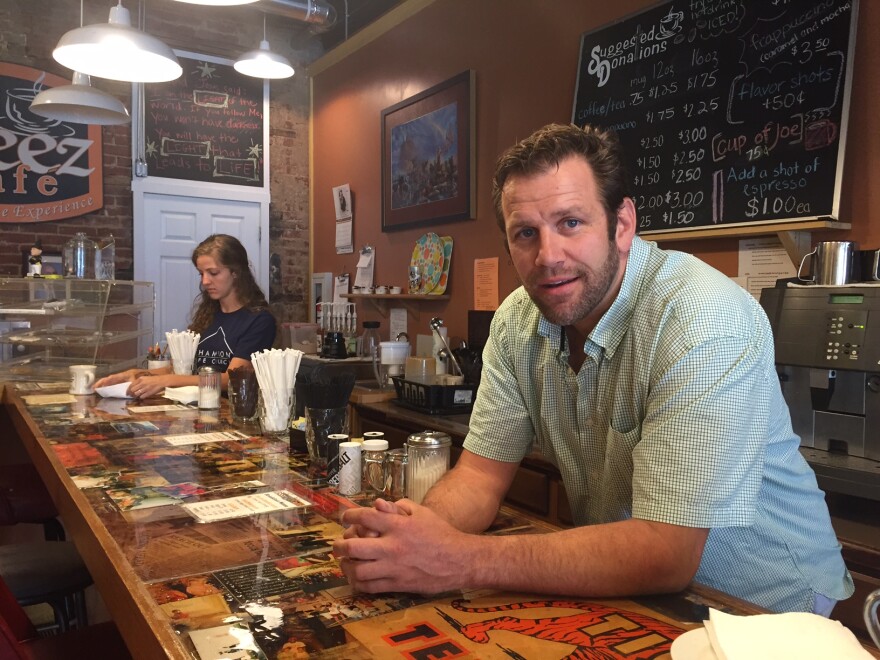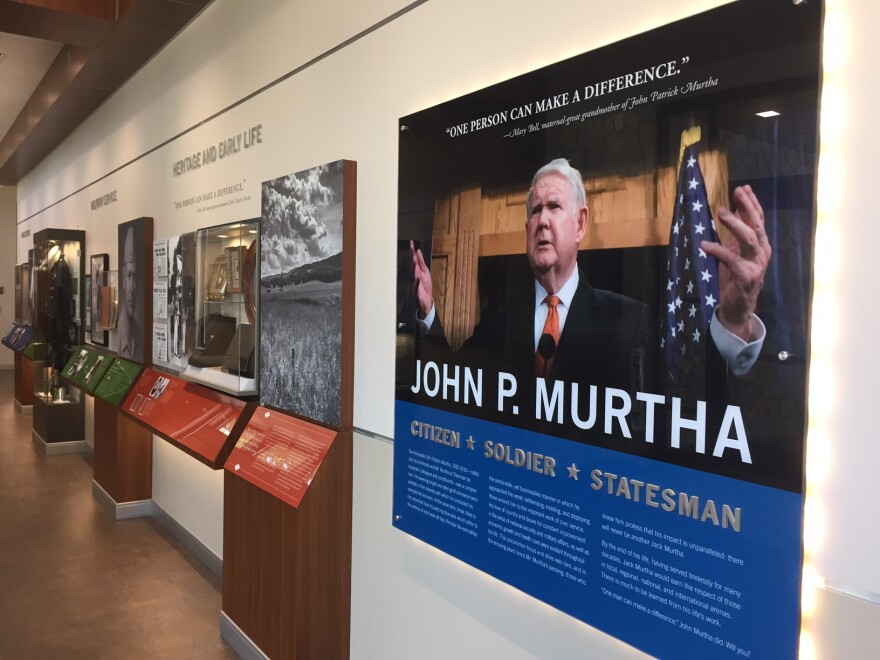In Southwestern Pennsylvania, there’s a congressional district that looks like a hammer.
Pennsylvania’s 12th district is all over the map, weaving its way through six counties and spanning more than 100 miles. On the eastern end is Somerset County’s Jennerstown. The population of 662 is almost entirely white.

The Coal Miner’s Café is a staple there, and it's decked-out with tools that recall the town's history.
“Old mining equipment is what you’re looking at hanging up,” said long-time resident June Diehl, walking through the main dining room full of mostly senior citizens. “I think those are the knee pads somebody wore, that’s an old lunch box up there, an old lantern.”
Diehl is having breakfast with her grandson before she takes him shoe shopping. She’s worked in the café for 35 years, although these days she just fills in on occasional shifts. But this town has changed a lot since she first started serving.
"Most of the businesses are gone that were here, like we used to have a grocery store, a hardware store, three other gas stations. They’re all gone,” she said.
Thousands used to work the mines in this county, including Diehl’s first husband and son-in-law. Now, she said, there are hardly any mining jobs left. Diehl said she cares about things like economic prosperity and affordable health care, so she always votes.
“I’m a democrat, although sometimes really wish I wasn’t,” she said.
Diehl said she bases her vote on whomever she thinks the best candidate is. For the past three presidential elections, they happen to all be republicans – including Donald Trump, who got 76 percent of the votes in Somerset County.
More than 100 miles west of Jennerstown is Beaver Falls, Beaver County. It's just a few miles from the Ohio border and gave Trump 57 percent of its votes. With a collapsed steel industry and a main drag lined with mostly closed store fronts, it looks comparable to Jennerstown. The population, however, is much larger and more diverse. Nearly 20 percent of Beaver Falls’ 8,000 residents are African-American.

“It’s a great town. It’s a great town with problems,” said Matthew Nance at the Beez Café in downtown Beaver Falls. The coffee shop is operated by the youth ministry, Tiger Pause, which Nance runs.
He’s lived here since he was a kid and explained that the long standing blue-leanings of the area aren’t what they seem.
“Democrats are really Republicans in Beaver County,” he said. “People are conservative here. They’re democrats because that’s what the union told them to be back when the steel mills were booming. That’s what their dads were and that’s what their moms said to do.”
As far as his vote, the 41-year-old said he’s neither republican nor democrat. He didn’t vote for Trump or Hillary Clinton.
“The only reason I vote anyway is for the unborn child, so I could care less about anything else,” he said.
He does like the incumbent representative of his district, a Republican who he said occasionally shows up in the town.
“Yes, I voted for Keith Rothfus, because I think he’s a great guy,” said Nance.
Beyond that, for Nance, the politics are of little consequence. He said the people of Beaver Falls shouldn’t rely on politicians’ promises.
“They keep thinking steels going to come back,” he said. “They thought U.S. Air’s going to come back, now they think the cracker plant’s going to save them. But really, rich people figure out how to stay rich and poor people keep suffering.”
But politics can have a major impact, and any talk about the politics in Pennsylvania’s 12th has to involve Democrat John Murtha, from Johnstown.

“First Vietnam combat veteran elected to the congress back in 1974,” said Ray Wrabley, political science professor at the University of Pittsburgh Johnstown. In those days, Wrabley said, steel was a big part of the Johnstown economy, before de-industrialization and the rapid closing of steel mills in the 1980s.
“Murtha was positioned to assist in some ways the transition to a kind of defense contractor, high-tech economy,” he said. “As the chair of the subcommittee that wrote the defense budget, he was able to use influence to bring defense dollars into this area.”
That cushioned Johnstown from the steel decline for a while. At the time, Republicans weren’t really putting up challengers to Murtha, who was well-liked at the time.
Cambria and Westmoreland Counties are historically democratic areas, Wrabley said, but the residents and their representatives have always been relatively conservative.
“Pro-life, pro-gun, NRA-endorsed, patriotic, pro-defense, hawkish on foreign policy,” Wrabley said. “But minimum wage, social security, union protection, so kind of old-fashioned labor democrat.”

Wrabley said in this population, when registered democrats vote for republicans, “ideologically, they’re being less inconsistent than it seems.”
Murtha held his seat until his death in 2010. In 2000, the congressional districts in the state were remapped to all have the same number of people. Republicans worked to gerrymander the 12th district, meaning they were strategic about drawing the boundary lines and used advanced mapping technology to plot out how to win the most seats in the state. A practice Wrabley said both parties take advantage of.
Murtha weathered the gerrymandering, winning in 2002, 2004, 2006 and 2008.
After his death in 2010, his office director, Mark Critz, won Murtha's seat in a special election. But the population in the area had been rapidly shrinking and still is. It’s older and whiter, and the defense industry declined. Critz didn’t have Murtha’s clout and was knocked out by Republican Keith Rothfus in 2012, who’s still in office.
Rothfus’ hometown Sewickley looks starkly distinct from many other areas of his district. It's one of Pittsburgh's most affluent suburbs, about 13 miles north of the city.
The 2010 redistricting incorporated Sewickley, a few more suburbs, a lot more college grads and white collar workers into the 12th.
Among the bustling storefronts of the borough’s main drag is the boutique Barberry Handmade. It features the work of local artists, as well as fair trade imported goods like beads, journals and organic honey.
Joan Baren Bregg, 63, works behind the counter. The self-identified democrat has lived in Sewickley for 10 years, and although this borough is known as being upper-class, she said she's struggled financially. She used to have her own art gallery here.
“So when I closed that due to economic downturn in 2012, I picked up some freelance jobs as a graphic designer. Not really able to do that as much anymore, so now I’m working retail,” she said.
The owner of the shop, Keith Recker, is also from Sewickley, and after decades away, he recently returned.
“It’s nice being back in a place where people say hello to each other on the sidewalk,” he said.

Sewickley is in Allegheny County, which turned for Hillary Clinton by more than 14 points in last year’s election.
Recker said he understands that Sewickley's proximity to Pittsburgh, and its attractiveness to white collar workers seeking respite from it, left his hometown in a very different economic situation than more industrial places like Johnstown and Beaver Falls, although he said he isn’t personally familiar with those areas.
“I think that’s why Sewickley has evolved into a really highly functioning, main street environment with a movie theater, a pharmacy, a liquor store, a grocery store, a bunch of specialty shops,” he said. “It really is performing as a small town main street in a way that I think a lot of communities can’t.”
Recker, a democrat, said he’s frustrated with Rothfus, who he said only votes along party lines.
“I pay close attention to how Mr. Rothfus votes on all the important issues, and Mr. Rothfus in no way shape or form represents anything that I can support,” said Recker.
But despite the range of economic and political beliefs in the district, Recker said a lot of voters share common ground.
“Many parts of this district are not polarized," he said. "We are neither pure democrats nor pure republicans. We are practical people who are looking for practical solutions.”
The district is scheduled to be redrawn after the 2020 census. The party in charge of that process will be decided after 2018’s midterm election.











